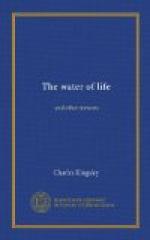SERMON XI. SOLOMON
Ecclesiastes i. 12-14.
I the Preacher was king over Israel in Jerusalem. And I gave my heart to seek and search out by wisdom concerning all things that are done under heaven: this sore travail hath God given to the sons of man to be exercised therewith. I have seen all the works that are done under the sun; and, behold, all is vanity and vexation of spirit.
All have heard of Solomon the Wise. His name has become a proverb among men. It was still more a proverb among the old Rabbis, the lawyers and scribes of the Gospels.
Their hero, the man of whom they delighted to talk and dream, was not David, the Psalmist, and the shepherd-boy, the man of many wanderings, and many sorrows: but his son Solomon, with all his wealth, and pomp and magic wisdom. Ever since our Lord’s time, if not before it, Solomon has been the national hero of the Jews; while David, as the truer type and pattern of the Lord Jesus Christ, has been the hero of Christians.
The Rabbis, with their Eastern fancy—childishly fond, to this day, of gold, and jewels, and outward pomp and show—would talk and dream of the lost glories of Solomon’s court; of his gilded and jewelled temple, with its pillars of sandal-wood from Ophir, and its sea of molten brass; of his ivory lion-throne, and his three hundred golden shields; of his fleets which went away into the far Indian sea, and came back after three years with foreign riches and curious beasts. And as if that had not been enough, they delighted to add to the truth fable upon fable. The Jews, after the time of the Babylonish captivity, seem to have more and more identified Wisdom with mere Magic; and therefore Solomon was, in their eyes, the master of all magicians. He knew the secrets of the stars, and of the elements, the secrets of all charms and spells. By virtue of his magic seal he had power over all those evil spirits, with which the Jews believed the earth and sky to be filled. He could command all spirits, force them to appear to him and bow before him, and send them to the ends of the earth to do his bidding. Nothing so fantastic, nothing so impossible, but those old Scribes and Pharisees imputed it to their idol, Solomon the Wise.
The Bible, of course, has no such fancies in it, and gives us a sober and rational account of Solomon’s wisdom, and of Solomon’s greatness.
It tells us how, when he was yet young, God appeared to him in a dream, and said, Ask what I shall give thee. And Solomon made answer -
’ . . . O Lord my God, Thou hast made Thy servant king instead of David my father; and I am but a little child: I know not how to go out or come in.
’Give therefore Thy servant an understanding heart to judge Thy people, that I may discern between good and bad: for who is able to judge this Thy so great a people?
’And the speech pleased the Lord, that Solomon had asked this thing.




